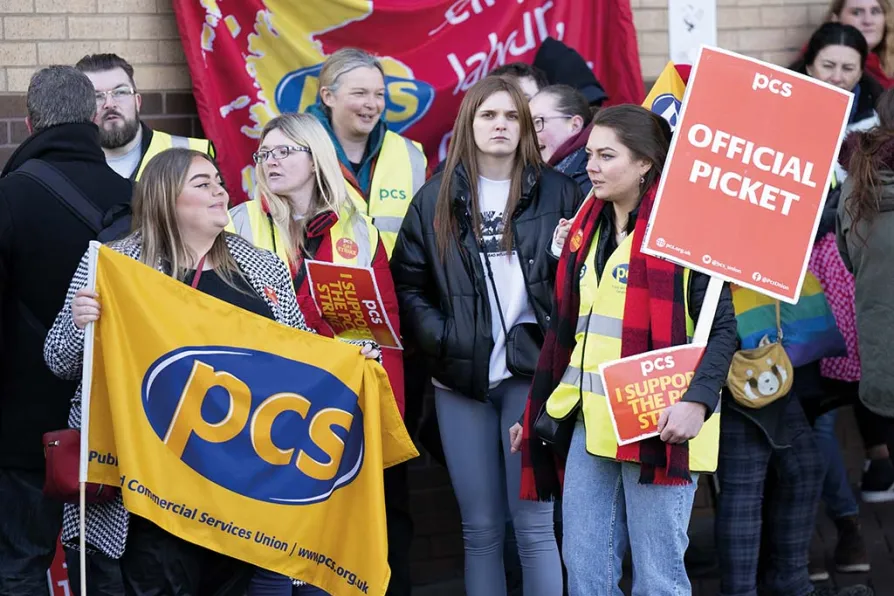PCS members face dangerous working conditions in crumbling buildings while the Common Platform IT system obstructs rather than streamlines operations — and Labour’s promised wave of insourcing has not materialised, writes SHARON McLEAN


THE justice system in England and Wales is at a crossroads. With court backlogs mounting, infrastructure crumbling, and justice sector workers under immense pressure, the need for a fully resourced court system has never been more urgent.
Court delays have reached critical levels, with thousands of cases waiting years for resolution. This backlog denies justice to victims, defendants, and families alike.
The shortage of barristers and judges has only worsened the crisis, with projections suggesting the backlog could soon reach 100,000 cases. As a past PCS campaign stated, “justice delayed is justice denied,” and it is every bit as true now. Every postponed hearing is a failure of the system to serve the public.
The physical state of many court buildings is equally troubling. Dilapidated and unsafe, they are unfit for purpose. Meanwhile, the Common Platform IT system, intended to modernise court operations, has been widely criticised as ineffective and obstructive. Rather than streamlining justice, it has introduced new barriers.
System failures have meant that recordings of outstanding and dealt with criminal cases have been consistently inaccurate. This also has an impact on court sitting days.
Justice sector workers — clerks, administrators, legal advisers — are PCS members and are the backbone of the system. Yet they report low pay, long hours, and unsafe working conditions. Prisons and courts are becoming more dangerous due to inadequate staffing and poor risk management. In prisons, Labour’s promised “biggest wave of insourcing” has not materialised, and private contractors preside over a £1.8 billion maintenance backlog.
The crisis in our courts cannot be viewed in isolation. As recent commentary in the Morning Star highlights, the demonisation of migrants and asylum-seekers is being used as a political distraction from systemic failures.
Scapegoating vulnerable communities does nothing to address the real issues — underfunded services, economic inequality, and a justice system in disrepair. We must reject these divisive tactics and fight to bring about political change so that the justice system serves all people fairly.
Equally concerning are proposals to restrict the right to trial by jury. As Anselm Eldergill argued (Taking Liberties, Morning Star, jury trials are a cornerstone of democracy and a vital check on state power. Removing this right in the name of efficiency risks undermining public confidence and eroding civil liberties.
A truly just system must be both effective and fair. Does anyone truly know how many outstanding cases there are? The fix is not to deny justice by jury, nor is it to enter swift plea bargaining: that is not justice for the victims and survivors of crime.
To restore faith in the justice system and protect those who serve it, we must recruit and retain adequate numbers of skilled court staff.
We must restore fair pay, conditions, and job security as part of a return to national pay bargaining in the Civil Service. Court buildings and the prison estate must be repaired and modernised. The government should reinstate legal aid and reduce court fees.
And Labour needs to meet its promise to the electorate, to end outsourcing and return justice services to public control. In addition, we need to see failed digital systems replaced with truly supportive tools. And the preservation of the right to trial by jury, upholding civil liberties.
PCS has urged, and continues to press MPs to support motions and funding for a fully resourced justice system and ask questions in Parliament to hold the government to account.
Justice is not a luxury. It is the foundation of a fair society. We ask all workers and our communities to back PCS’s call for safe, fair, and properly staffed workplaces and advocate for access to justice as a fundamental democratic right — not a privilege for the few.
Sharon McLean is PCS Ministry of Justice group president.

The government’s case for abolishing most jury trials doesn’t stand up to scrutiny, argues KIM JOHNSON MP – and it must be stopped before it does lasting damage to democracy

ANSELM ELDERGILL examines the government’s proposals to further limit the right of citizens to trial by jury












